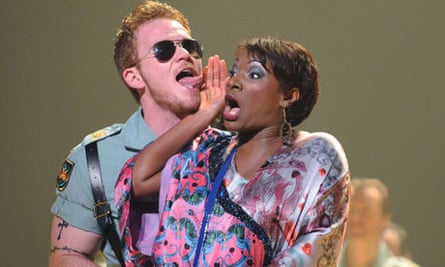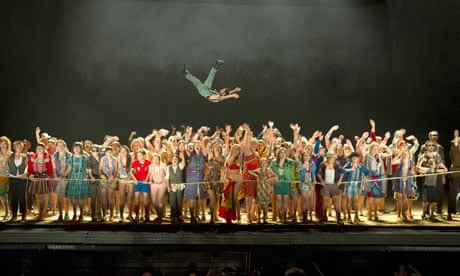Catalan director Calixto Bieito has a reputation for being something of a provocateur as far as his operatic stagings are concerned. So it will doubtless surprise some to discover that his production of Carmen – first seen in Barcelona in 2010, and now taken into ENO's repertory – is a cogent, gripping piece of work, which, despite occasional moments of excess, probes Bizet's masterpiece with considerable subtlety.
Much of its force derives from Bieito's understanding of the insistent nature of male sexuality. We're in the closing years of Franco's Spain. Adam Diegel's handsome José belongs to a platoon of testosterone-fuelled soldiers who relentlessly pursue girls the moment they are off duty. The smugglers, meanwhile, treat women little better than the commodities they take across the border. The atmosphere is thick with machismo. In one extraordinary scene, a lone, unobserved soldier briefly escapes it by stripping off his uniform and dancing, relaxed and naked, in the moonlight.
This is also the world in which Ruxandra Donose's Carmen struggles to maintain her sense of integrity and independence. We first see her in a phonebox, singing the famous recitative about the intransigence of love down the phone to a former partner. When she and Diegel first lock eyes, we sense not only her desire but also her determined self-control. In José's duet with Elizabeth Llewellyn's Micaela, however, we've already seen his confused attitudes and pathological temper, and know that what lies ahead is catastrophe. The final scene is both terrifying in its veracity and fierce in its compassion.

There are a few flaws, dramatically and musically. Bieito occasionally overdoes the emphasis on male violence. It's also very much part of his concept that Llewellyn should play Micaela as a woman determined to get her man back by whatever means she can, though the resulting characterisation sits uneasily with the moral dignity of her music.
There's some fine singing, with the women marginally better than the men. This is, by far, Donose's best UK performance to date, while Llewellyn, radiant as always, just goes from strength to strength. Diegel's physicality and theatrical subtlety aren't always matched by a corresponding range of vocal colour, while Leigh Melrose's Escamillo, in contrast, doesn't quite have the presence to go with his vocal glamour. Conductor Ryan Wigglesworth is better at hard-edged excitement than sensual languor. But for all its inequalities, this is intelligent, fascinating music theatre and well worth seeing.

Comments (…)
Sign in or create your Guardian account to join the discussion